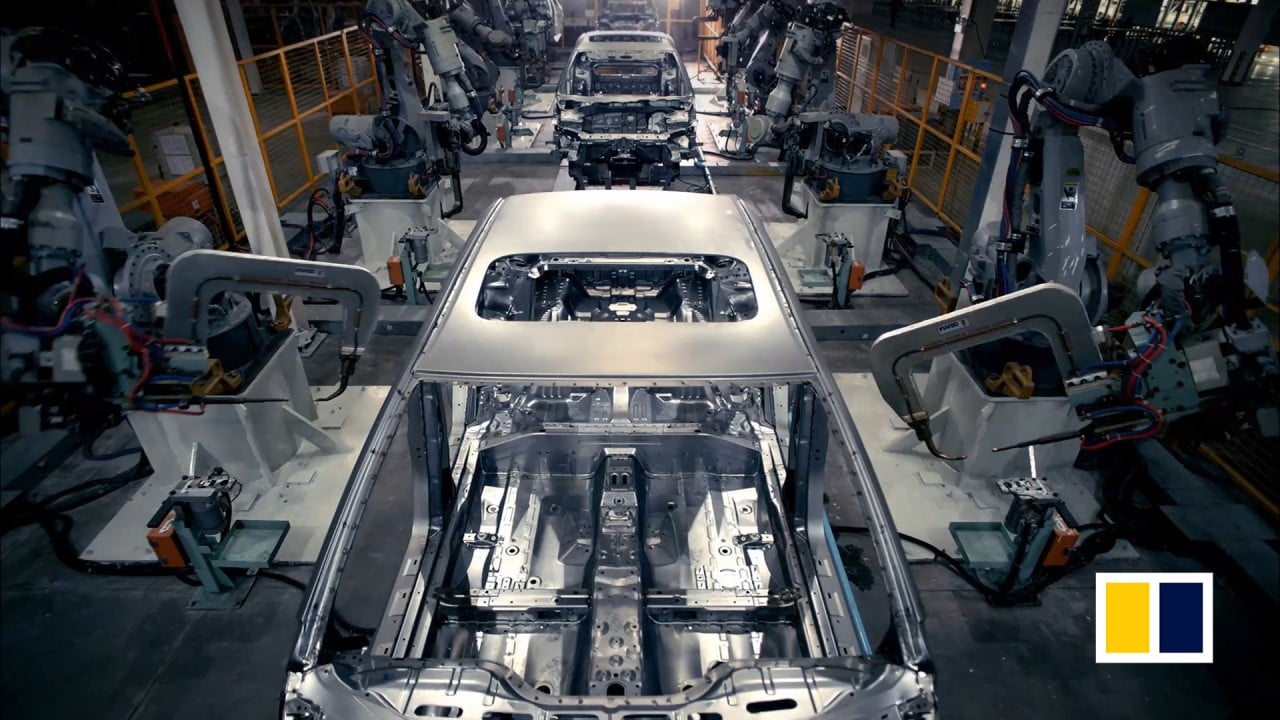
Chinese parts suppliers ride Tesla-powered electric-car boom as top battery maker surpasses Bank of China, Midea, PetroChina in size
- Contemporary Amperex has returned 424 per cent over the past 12 months, making it the eighth largest listed company in China by market value
- Others in the Tesla ecosystem have seen less than stellar performances amid concerns about margins, analysts say
The electric-car boom has catapulted Contemporary Amperex Technology Limited (CATL) into China’s eighth largest stock by market value at 942.3 billion yuan (US$145.5 billion), according to Bloomberg data, surpassing Bank of China, appliances maker Midea and PetroChina.
The electric-car battery maker has returned 424 per cent over the past 12 months, while the CSI 300 index of the biggest companies on the Shanghai and Shenzhen exchanges gained 88 per cent. On average, 144 mainland-listed car-component makers in Tesla’s ecosystem rose about 39 per cent over the same period, according to an index created by consultancy East Money Information.
A stronger conviction may be needed to repeat or surpass that performance, as electric-car makers start ramping up production and deliveries to meet pent-up demand while margins come under pressure, according to Ding Haifeng, a consultant with Shanghai-based financial advisory firm Integrity.
“The car component suppliers may benefit from a jump in deliveries of Tesla and other electric cars,” said Ding. “Their earnings outlook appears to be better in 2021, but they need to prove it. Investors have not been convinced yet.”
Tesla slashed prices of the Model Y by 30 per cent from when it began accepting presale bookings in June last year. That may explain why CATL and its peers have lost some of their early New Year gloss.

Shenzhen-listed CATL, whose battery packs are used in most NEV brands, surged 17 per cent to 413.20 yuan between Monday and Thursday before closing 2.1 per cent weaker on Friday at 404.50 yuan. The stock is seen weakening to about 342 yuan over 12 months, based on consensus price targets, according to Bloomberg data.
Shares of mould-parts maker Ningbo Xusheng Auto Technology are seen rising 48 per cent over 12 months to 51 yuan, according to consensus. Antenna and fingerprint-recognition systems provider Huizhou Speed Wireless Technology may increase 61 per cent to 20.66 yuan, according to Huatai Securities.
Electric vehicle development is an attractive theme, backed by both domestic demand and the local industry’s increasing presence in the global EV supply chain, according to Kai Kong Chay, senior portfolio manager for Greater China equities at Manulife Investment Management. A few domestic mid-end models tailored to Chinese consumers have been very well received, showcasing the capability of Chinese EV brands to adapt and cater for local needs and taste, he added in a report last week.
Tesla announced on its China website that the first batch of Model Y vehicles were expected to be delivered this month. Buyers at showrooms have been told to wait until late February for deliveries because initial production capacity would not be able to meet the frenzied demand.
If anything, the hot reception has given credence to industry forecasts that sales of new electric vehicles (NEVs) in the world’s biggest market will jump 40 per cent this year.

01:47
Behind the scenes at BYD Auto: China’s biggest electric vehicle factory
The China Association of Automobile Manufacturers sees sales topping 1.8 million units in 2021, compared to an estimated 1.3 million units last year, on the back of cash subsidies, consumption tax breaks, and free car-plate licenses. By 2025, they could hit 3 million, according to industry officials.
Deliveries of green cars are expected to account for a fifth of the total vehicle market by 2025, up from less than 5 per cent last year, Nick Lai, an analyst at JPMorgan, wrote in a research note in October.
“Competition will get fiercer this year as all EV makers look to slash production costs to make their cars more attractive to buyers,” said Peter Chen, an engineer with car component company TRW. “The suppliers need to be prepared to lower prices, reduce margins, to win orders” from car makers, he added.
CATL produces lithium-iron-phosphate (LFP) batteries that are claimed to be cheaper than the nickel-manganese-cobalt types currently used in the Model Y and produced by LG Chem. LFP batteries can help Tesla slash its costs by 15,000 yuan each, according to the China Yiwei Institute of Economics.
Ningbo Xusheng stock jumped 10 per cent on January 4, only to slip 1 per cent in the next four days to 34.52 yuan in Shanghai on Friday. Since November, when it announced early talks with Tesla, Huizhou Speed has declined 11 per cent to 12.80 yuan on Friday.
“Investors need them to sign substantial deals to enhance their performance and stock prices,” said Ding, the Shanghai consultant at Infinity.

